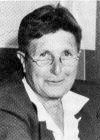Florence Nightingale David (1909-1993)

Reprinted with the permission of the Institute of Mathematical Statistics
Florence Nightingale David was named after her parents' good friend Florence Nightingale. She was always a quick learner and studied mathematics in London as an adult. She would have liked to work as an actuary, but that and similar professions were only available to men. Instead, she decided to introduce herself to Karl Pearson, and he offered her the opportunity to research under his supervision at University College with a scholarship to continue her studies. During her time there, she met and was able to closely observe Egon Pearson, Jerzy Neyman, Karl Pearson, and Ronald Fisher. Of Neyman, she said he was an outstanding lecturer, taking his time and answering student questions. In contrast, Fisher was a terrible lecturer. He would not answer her questions because she was female, so she would sit next to a male friend, and he would ask questions for her.
F.N. David got to know many of the leading statisticians of
the time. She remarked that working at the university, Fisher
was upstairs…, Neyman on one side and K.P. on the other side
and Gosset coming in every other week
(Salsburg, 2001,
p. 156). However, because of prejudice against women, she
always worked as an assistant, even after she earned her Ph.D.
Despite the lack of respect, she was involved in every branch
of statistics at the time.
In 1939, she was working at the Ministry of Home Security for Britain, helping to anticipate consequences of certain big cities being bombed, such as reduced access to electricity, water, or other essentials. Because of their work, London was able to prepare to maintain access to necessities during the German blitz in 1940 and 1941.
David wrote Combinatorial Chance about combinatorics
and On Games, Gods, and Gambling which describes the
development of probability theory. This is a source used for
some of the research here. A line in her book reads The man
creates the mathematical theorem, but the events of a man's
life create the man, and the three are indissoluble. (p. x)
.